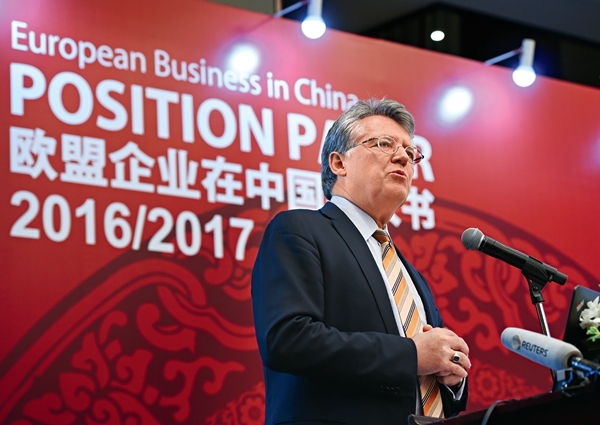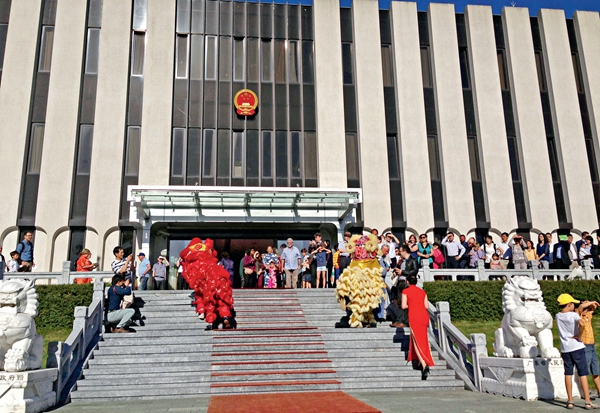By ZHENG RUOLIN
By ZHENG RUOLIN
THE nature of China’s relationship with Europe is often determined by Washington. My French friends, however, vehemently deny this. They insist that France upholds an independent foreign policy and does not allow other countries to influence its bilateral relationships. They point out that France, under the presidency of General de Gaulle, was the first large Western nation to establish formal diplomatic relations with the People’s Republic of China.

While this is true, times have now changed. France today, as a member of the EU, is quite different from the country it was during the time of de Gaulle.
Take the EU arms embargo on China, for example, which has existed since 1989. Jacques Chirac, then French president, called for an end to the embargo, but a consensus was never reached by the EU due to opposition from the U.S. This somewhat hampered further progress in China-EU relations. France has been struggling with tricky diplomatic positions ever since. The new U.S. president has infused the situation with even more uncertainty.
Challenges for Europe’s Relations with America
When George W. Bush was President, relations between Europe and the U.S. were rather tense. France, under the wing of Jacques Chirac, was at the forefront of opposition to the Iraq War. The anti-war speech delivered by the then French Foreign Minister Dominique de Villepin at the UN Security Council in 2003 won universal praise. Former Foreign Minister, Hubert Vedrine, accused the U.S. of oversimplifying the situation and advocating unilateralism. I interviewed Mr. Vedrine for Wen Hui Bao. At that time we were the first publication outside of France to cover the story and give a positive critique of Mr. Vedrine’s left-wing remarks.
France supported Bush’s rival, John Kerry, during Bush’s re-election campaign. At the G8 Summit in Evian, France, shortly after the start of the Iraq War in 2003, President Chirac invited the leaders of several countries, including China, to hold an informal South-North dialogue, aimed at guarding against any provocation from the U.S. concerning the Iraq War. On the back of this, Sino-French and Sino-European ties steadily developed during the eight years of the Bush administration.

The current U.S. administration seems to be going down the same road. Decrees issued by President Trump challenge long-held European values. Trump does not support the agreements made at the Paris UN Climate Change Conference, which raises serious concerns for the French government. He has also welcomed Britain’s decision to leave the EU, which Europe mourns. Trump’s criticisms of Germany’s refugee policy run counter to the humanitarianism widely advocated in Europe. His order to deny visas to citizens of seven different Muslim countries, moreover, blatantly flouted basic Western values.
Opposition can be found in every quarter, from ordinary U.S. citizens to top officials in Europe. During his visit to Tehran last January, French Foreign Minister Jean-Marc Ayrault vowed to increase the number of visas issued to Iranians.
Notably, Minister Ayrault also criticized Trump’s challenge to the one-China policy. “China is a great country,” he said. “There may be disagreements with China, but we do not talk like that to a partner.”
His opinion is shared by several state leaders. During a meeting with German Chancellor Angela Merkel in January, French President Francois Hollande highlighted challenges posed by the new U.S. administration regarding commercial rules and international conflict. “Of course we have to speak to Donald Trump,” said Hollande, “as he was chosen by the Americans to be their President, but we must do it with a European point of view and promote our interests and values.”
It seems that Europe and the U.S. now display the greatest ideological divergence since the start of the Iraq War. The two sides have completely opposing values and conflicting stances on such issues as globalization, free trade, climate change, diplomatic relations with Russia, illegal immigrants and refugees.
Opportunities for China-EU Cooperation
In the meantime, China and Europe are taking a similar position on growing numbers of global issues. In my opinion, this presents a golden opportunity for further progress in bilateral relations.
The French press praised the speech Chinese President Xi Jinping delivered at the annual meeting of the World Economic Forum held in Davos in January 2017. In an article entitled “Xi Jinping Sings a Hymn to Free Trade and Globalization,” Le Figaro commented that Xi’s speech “fully corresponded to the values of internationalism and was interrupted several times by applause.” This observation has been widely echoed by other members of the French press.
Europe is beginning to realize that the situation today sees China as a defender of established international rules, free trade, and globalization, whereas America is playing the role of troublemaker.
According to the European media, EU-U.S. relations are entering an unprecedented phase. The U.S. has completely abandoned the policy advocated by previous governments to support Europe’s development as a cohesive whole. Instead, the Trump administration wants to see a divided Europe with fragmented countries that are much easier to override. The interests of the U.S. can then be pushed forward in the most effective way.
Contrary to this, China has always supported European integration. It is likely that EU-U.S. relations will evolve in a direction opposite to that between Europe and China. The more disagreements Europe has with the U.S., the more firmly it cements its ties with China.
Therefore, Sino-EU cooperation embraces an inviting prospect. Joint efforts can be made in a good number of areas, including tackling climate change, promoting bilateral trade, facilitating collaboration in finance and investment, cooperation in Africa, and the Belt and Road Initiative, which former French Prime Minister Dominique de Villepin described as the most important development project in the world today.
In addition, at the 2016 Hangzhou G20 Summit, China called for collaboration in the field of innovation which was an historic moment in the development of China-EU relations. In one way, therefore, Trump’s defensive concept of “America First” may actually end up bringing China and Europe closer together.
Mutual Understanding without Prejudice
So far, “pride and prejudice” – a Cold War legacy – has proved the sole remaining obstacle to the all-round progress of Sino-EU relations. We cannot ignore the persistent view of China as a backward nation, perpetrated by people critical of China’s political system and who give the country bad press because the Western idea of a general election is absent in China. Obviously, the idea of “original sin from a democratic point of view” has no place in the ever-diversifying modern world.
China is a developing country with a population of 1.3 billion. It is absurd to copy and transpose the political system of a country with a much smaller population (France, say) to this enormous country without making any adaptations.
“Practice is the sole criterion for testing truth” is a well-known proverb in China. Public opinion polls conducted by both domestic and international organizations over the past 30 years have demonstrated that the Chinese government is among the most popular governments in the world. Over the decades, the Chinese government has endeavored to improve living standards, and has been widely supported by its people.
It is true that China’s political system has its own defining characteristics and differs from political models in the West, the former Soviet Union, or North Korea. Should Europe choose to perceive China without ideological prejudice, and cordially promote bilateral cooperation, it could counterbalance the worrying trends of racism and trade protectionism championed by Donald Trump since he became U.S. President.
In his speech at the Davos Forum, President Xi Jinping welcomed other countries aboard the express train of China’s rapid development. What’s more, China has promised to further open its domestic market while increasing investment abroad. At present, Europe is in great need of both the Chinese market and its investments. As China has already expressed a strong willingness to cooperate, it is Europe’s turn to unveil its plan of action.
National elections will be held in France and Germany over the next few months. We are curious to see whether these two major EU countries will elect political leaders who embrace global and strategic visions and have a good understanding of the development prospects of China, the U.S., and the world. We look forward to the results.
ZHENG RUOLIN is the former senior foreign correspondent in Paris of Shanghai-based Wen Hui Bao and author of The Chinese Are People Like You and Me.